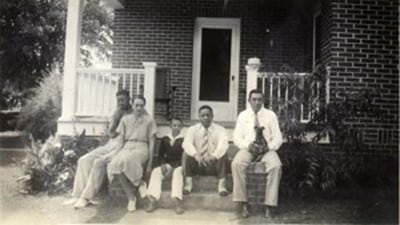NEWS
Echoes of Slavery: The Nortons
 Davidson barber Ralph Johnson’s mother was Bessie Norton, and she, too, was a descendant of enslaved people. Her father, Charles, came from near Stony Point in Alexander County, North Carolina, and along with his parents Harry and Maria (Mariah) and his two brothers and three sisters, was once enslaved by Nicholas Norton. According to Johnson, Maria had been brought, already enslaved, from England. Among their children was Charles’ brother, Rufus; they both later settled in Mecklenburg County. When Nicholas wrote his will in 1862, he bequeathed Charles to his wife, Sarah, and Rufus to his son, John. Nicholas Norton died in 1863, but there are no probate records available.
Davidson barber Ralph Johnson’s mother was Bessie Norton, and she, too, was a descendant of enslaved people. Her father, Charles, came from near Stony Point in Alexander County, North Carolina, and along with his parents Harry and Maria (Mariah) and his two brothers and three sisters, was once enslaved by Nicholas Norton. According to Johnson, Maria had been brought, already enslaved, from England. Among their children was Charles’ brother, Rufus; they both later settled in Mecklenburg County. When Nicholas wrote his will in 1862, he bequeathed Charles to his wife, Sarah, and Rufus to his son, John. Nicholas Norton died in 1863, but there are no probate records available.
In his book David Played a Harp, Johnson remembered being told that his great-grandfather, Harry, earned money by working in Nicholas’ gold mine, and he used it to buy his freedom before the end of the Civil War. He was raising money to buy his wife Maria and his children when Maria and five of the children, including Rufus, were “sold down south.” Charles was still enslaved by the Nortons when the Civil War ended in 1865.
In 1870, Charles Norton, age 14, was living in Alexander County with his parents, Harry and Mariah. He was described as a mulatto and was illiterate, although he was attending school.
By 1880, Charles, then single, was living in Lemley Township and working as a laborer. He married Isabella (Isabelle) Clark in February of 1881. By 1900, he and Isabella were living in a rented house in Davidson. Charles was a farmer, and he had learned to read and write. By 1910, Charles and Isabella were living on North Main Street. Ralph Johnson remembered their “one-story, six-room frame house,” which they owned. They did not own the land, however; Charles worked it on shares, providing the animals, tools, and labor and receiving 2/3 of the crop in payment.
Isabella, too, was the child of enslaved people, Jonas and Violet Long Clark of Iredell County. Jonas and Violet married in 1866, soon after the Civil War ended. Some sources, however, indicate that they may have been together earlier. In 1870, they were living in Mt. Mourne, where he was a farm hand, and she was keeping house. They had eight children, the oldest of whom was 16-year-old Isabella. They remained in Davidson Township in Iredell County in 1900 and 1910. Both were illiterate.
Ralph Johnson knew Jonas only briefly, but he described him as a “slight black man with wooly gray hair and a perpetual kindness in his demeanor.” When Jonas died, Violet remained in their cabin until she needed help, and then stayed with each of her children for several months at a time. When Ralph Johnson knew Violet, she was living in a one-room log cabin on her son William’s farm. Ralph remembered that she cooked over an open fireplace.
Violet also stayed with Charles and Isabelle, where she would sit in front of the fire “telling stories of the Indians and the deer that roamed at large in the area when she was young…With a hot toddy in one hand…she was a storyteller that could make your hair stand on end in fright or double you up in laughter.” Violet was 103 when she died, and Ralph remembered that she never mentioned her days as an enslaved person.
Charles and Isabella had eight children, seven of whom survived. In the census, she is described as a mulatto, and Ralph noted that she “could more easily have been taken for a white person than not.” She had a fair complexion and waist-length brown hair, which was “beautiful as it hung around her shoulders.” Their children were listed as Bessie, Mamie, Finnie, Issie, Jennie, Hood, and Rutledge. Hood and Rutledge would later become local barbers, and it was Hood who later adopted longtime Davidson barber, Ken Norton. Charles and Isabella remained on North Main Street with two of their adult daughters until 1930. According to death records, Isabella died in 1933.

Hood Norton and his family at their Lorimer Street home (Courtesy of the Davidson College Archives)
Although Charles’ brother Rufus apparently vanished for a time after the Civil War, he was in Mecklenburg County in 1883, where he married Milly Harry. In 1900, they were living near Huntersville; both were illiterate, as they had never attended school. They lived in a rented home, and in 1920 Rufus was still working as a farm laborer at the age of 75. Ralph Johnson visited them over the years until Rufus’ death in 1924 and noted that they had no children, even though they loved them. He remembered watching his Uncle Rufus weave cotton baskets from white oak strips. Millie, he remembers as a religious woman, whom Rufus drove to the Torrence Chapel Methodist Church every Sunday.
Rufus never entered the church but having brought fodder for the mule and corn whiskey for himself, he waited outside. According to Ralph, “I have heard…that he had spoken of why he did not worship God, and that it had to do with something that happened to him in slavery. I do not remember ever having heard him relate any of his experiences as a slave.”


